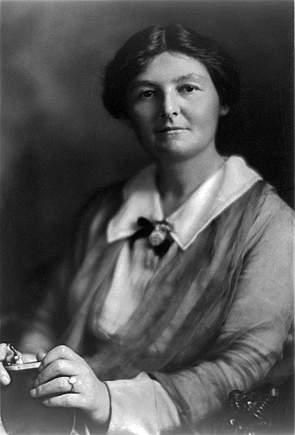[From the Beds & Herts Saturday Telegraph: May 3rd, 1919]
Miss Margaret Bondfield, one of the best-known Labour leaders and Acting General Secretary of the National Federation of Women Workers, preached the gospel of unity through the Trade Union movement at a well-attended meeting at Luton last night [May 2nd, 1919].
 The meeting was held in the Town Hall, and Mr W. J. Mair JP occupied the chair. The proceedings were under the auspices of the Federation and some of the candid references made relative to straw trade employment conditions elicited loud applause.
The meeting was held in the Town Hall, and Mr W. J. Mair JP occupied the chair. The proceedings were under the auspices of the Federation and some of the candid references made relative to straw trade employment conditions elicited loud applause.
The Chairman, in a brief opening statement, said the fact that the women workers in the straw trade were about to organise and were prepared to support the Labour movement was indicative of the spirit of the times.
Miss Bondfield (pictured right), in the course of an attractive and much applauded address, opened with the revelation that “I used to sell hats and you used to make them”. Like all other industries, she said, the straw trade was undergoing a transformation. It was bound to be affected by the changed conditions of production and the altered outlook and state of mind animating the women workers of the day.
She had been told that evening that there were girls in Luton who were afraid to join a Union. In all large centres of industry that fear was a thing of the past – it had been banished by the development and necessities of the situation and by the growth of importance of the Trade Union movement in the general economic scheme.
Coming specially to the straw trade, Miss Bondfield said she realised the difficulties in regard to organisation in an industry which embraced a large proportion of home workers. By joining the Federation, the straw workers would get better wages and better conditions, but they would also “remove from Luton the reproach of being the headquarters of one of the few sweated trades left in this country. A town which tolerated such a state of things was doing a disservice not only to itself and its people but to industry generally.
“I sold hats for 15 years, on and off, and allowing for changes in figures and in relative values, I say that as between the selling price to the consumer and the price given to the worker for making the hat, is a very large margin of profit which goes somewhere.
Framing a case on these lines, the speaker referred to the “ordinary 4s 6d a dozen straw hat”. For this she allowed a total to the employee of 8d, and said that in London shop windows the finished article was ticketed at 15 shillings. Raw material, labour, packing and administrative charges she estimated, on the most generous basis at 7s 8d. “Well, what I ask is, who gets the other half of the money?”
On the present selling price of hats, she contended, there was a margin of profit fully sufficient to pay a real living wage to the operatives.
A system of “dishonest apprenticeship” which exploited girl learners was condemned by the speaker, though she agreed that the best employers were not guilty in this respect. “The policy,” she said, “is one which exploits the young people of a town for the purposes of piling up unholy profits, and it is the duty of the workers to organise and sweep away these injustices.”
She added: “The straw trade is a parasite industry. Purge it from that disgrace and make it self-respecting, as it ought to be.”

